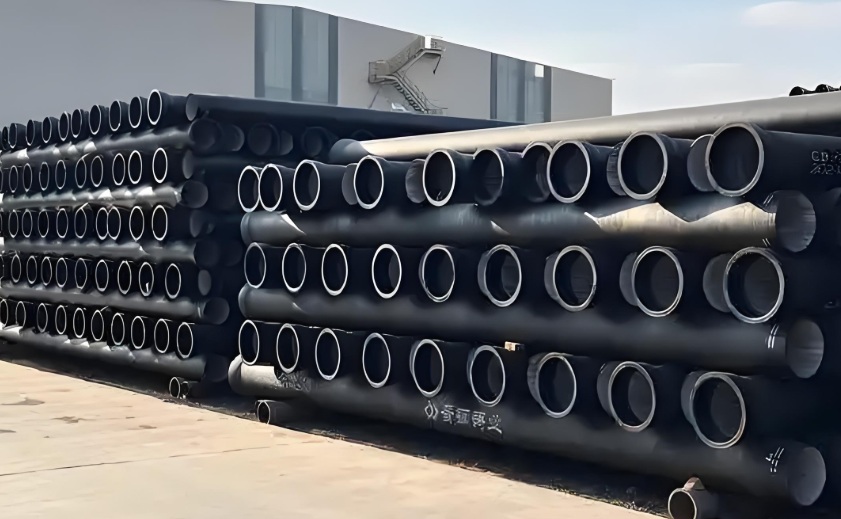Ductile iron pipes, also known as nodular cast iron pipes, are widely used in water supply, drainage, and heating systems due to their exceptional mechanical properties and durability. Compared to traditional cast iron pipes and other materials, ductile iron pipes offer numerous advantages that make them a preferred choice in modern piping applications.

1. Unmatched Strength & Flexibility
Ductile iron pipes (DIP) use spheroidal graphite cast iron, combining 420+ MPa tensile strength (60,900 psi) with 10% elongation for flexibility. This means:
-
Crush resistance: Withstands 7,000 psi (ASTM D2412) vs. PVC’s 1,200 psi.
-
Ground movement resilience: Handles seismic shifts without cracking.
-
Gray cast iron: Brittle and prone to fractures under stress.
2. Corrosion Resistance for Century-Long Service
DIP’s multi-layer protection ensures durability in harsh environments:
-
External coatings: Zinc + bitumen (standard), epoxy (chemical resistance), or polyurethane (marine/acidic soils).
-
Internal linings: Cement mortar (CML) or polyethylene (PE) for smooth flow and water quality.
-
Lifespan: 100+ years with proper installation vs. steel’s 30–50 years (requires frequent coatings).
3. Leak-Proof Joint Systems
DIP’s rubber gasket joints (e.g., TYTON®) outperform traditional methods:
| Joint Type | Leak Risk | Installation Speed |
|---|---|---|
| DIP Rubber Gasket | Near-zero | Fast, tool-free |
| Cast Iron Flanged | Moderate | Slow, bolts required |
| PVC Solvent Welding | High (if flawed) | Skill-dependent |
4. Extreme Temperature Performance
DIP operates seamlessly from -20°C to 50°C (-4°F to 122°F), unlike plastics:
-
Fire safety: Maintains integrity at 600°C (1,112°F) vs. PVC’s 140°C melting point (NFPA 241).
-
Freeze resistance: Withstands ice pressure without bursting.
5. Cost Efficiency Over 100+ Years
While DIP’s upfront cost is 20–30% higher than PVC, its lower lifetime cost shines:
-
Replacement cycles: DIP lasts 2–3x longer than PVC/steel.
-
Maintenance: No corrosion monitoring vs. steel’s annual inspections.
-
Recyclability: 100% recyclable, reducing landfill waste vs. plastic alternatives.
6. Eco-Friendly Infrastructure Choice
-
Circular economy: 90% recycled content in modern DIP production.
-
Zero microplastic risk: Unlike HDPE/PVC, DIP doesn’t degrade into harmful particles.
7. Versatile Applications
DIP excels in critical systems:
-
Potable water: Safe, NSF/ANSI 61-certified linings.
-
Wastewater: Resists H2S-induced corrosion.
-
Mining: Handles abrasive slurries at 64+ bar pressure.
-
Fire protection: Non-combustible, unlike plastic pipes.
8. DIP vs. Alternatives: Quick Comparison
| Feature | Ductile Iron | PVC | Steel |
|---|---|---|---|
| Crush Strength | 7,000 psi | 1,200 psi | 4,000 psi |
| Corrosion Resistance | High | Moderate | Low (needs coatings) |
| Fire Resistance | Non-combustible | Melts at 140°C | Warps at 540°C |
| Lifespan | 100+ years | 50–75 years | 30–50 years |
9. Installation Best Practices
-
Trench design: Use granular bedding (ASTM D2321) to prevent point loads.
-
Joint assembly: Lubricate rubber gaskets with NSF-approved silicone.
-
Testing: Conduct hydrostatic tests at 1.5x working pressure (AWWA C600).
10. FAQs
Q: Can DIP replace aging cast iron pipes?
A: Yes! DIP’s identical diameters simplify retrofitting with no system redesign.
Q: Is DIP suitable for seawater applications?
A: Use polyurethane-coated DIP (EN 598) for saltwater corrosion resistance.
Q: How does DIP handle acidic soils?
A: Epoxy coatings (ANSI/AWWA C116) protect against pH levels as low as 3.5.
Ductile iron pipes deliver unmatched durability, safety, and cost savings for water, wastewater, and industrial systems. With ISO 2531, AWWA C151, and EN 545 compliance, they’re the global standard for resilient infrastructure.
References:
- Ductile Iron Pipe – Wikipedia
- ASTM D2412 – Standard Test Method for Determining the External Loading Characteristics of Plastic Pipe by Parallel Plate Loading
- American Water Works Association (AWWA) – Standards
- ISO 2531 – Ductile Iron Pipes
- European Committee for Standardization (CEN) – Ductile Iron Pipes
